
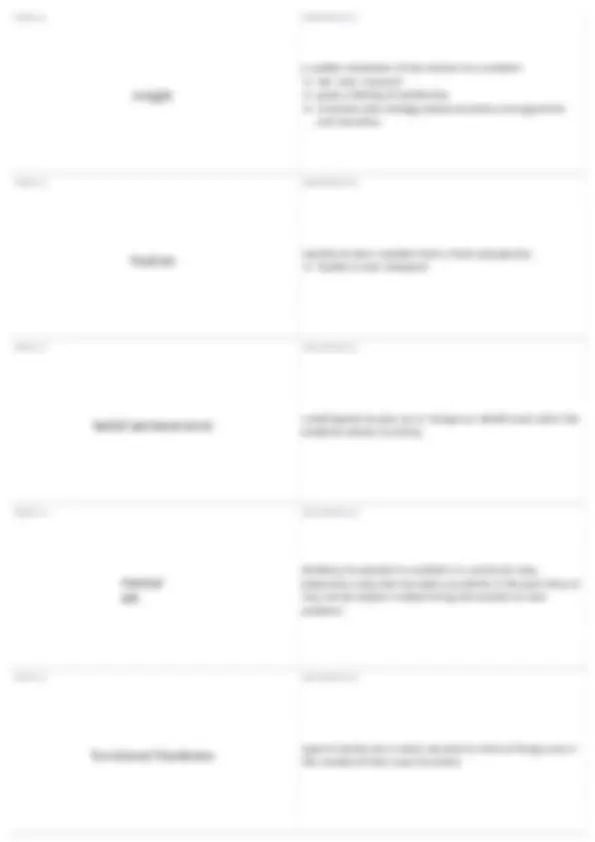
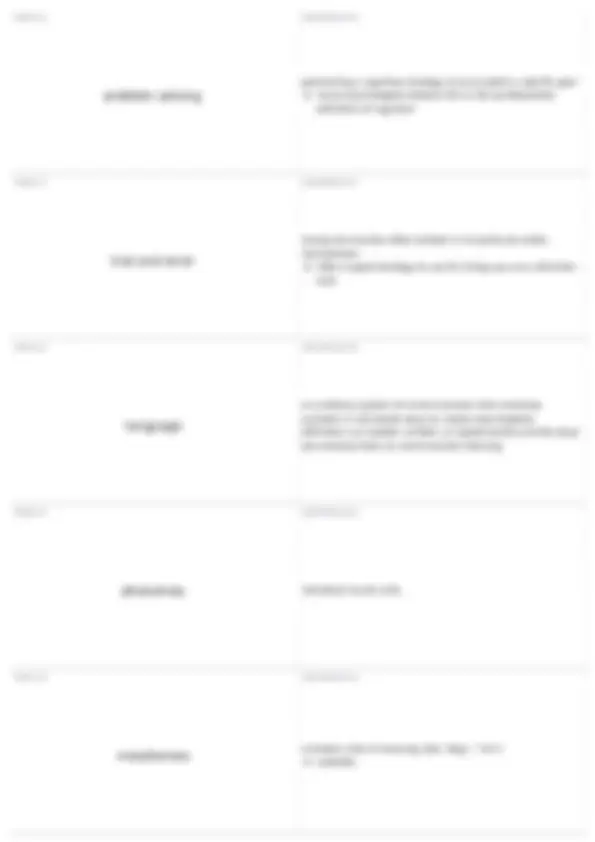
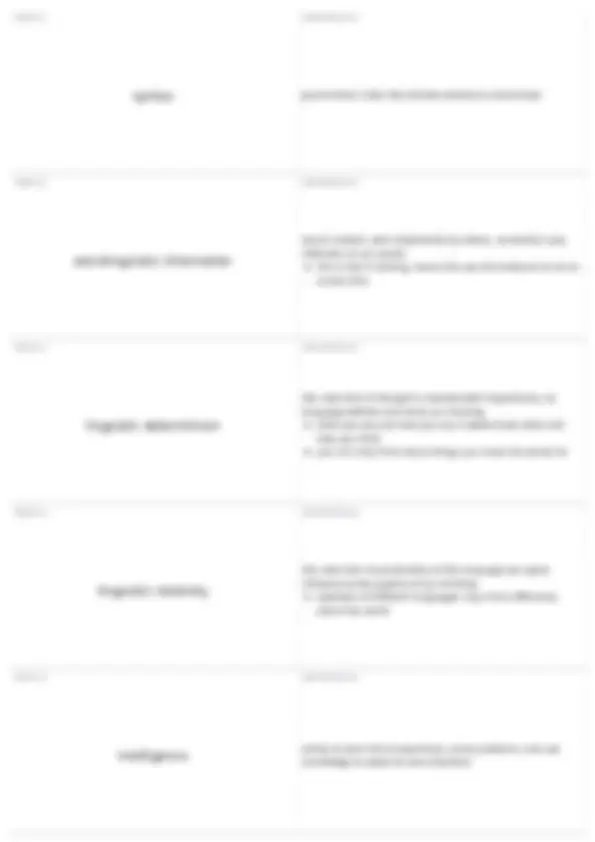
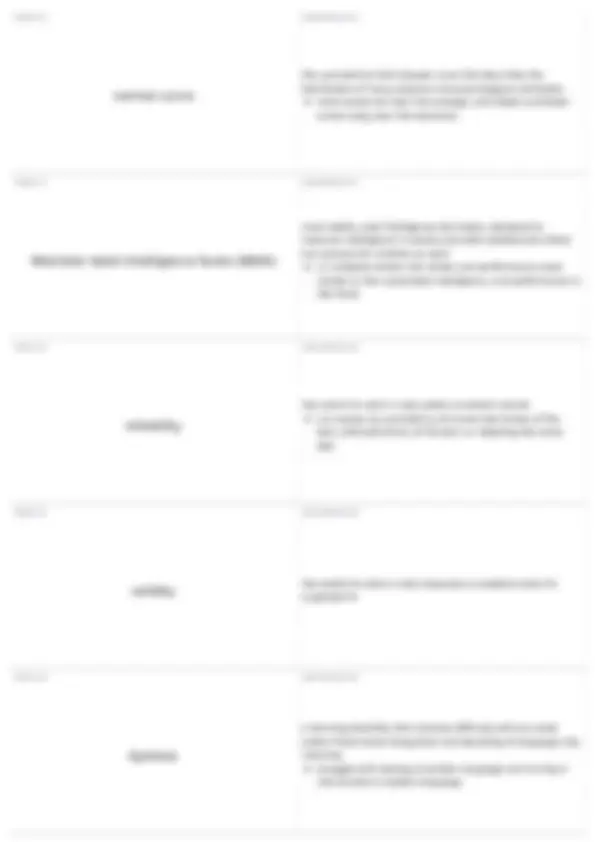
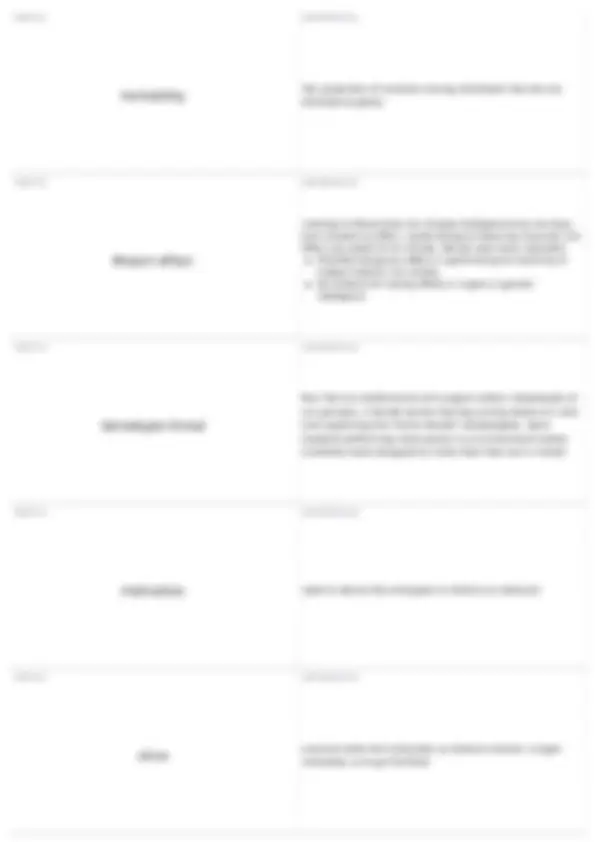
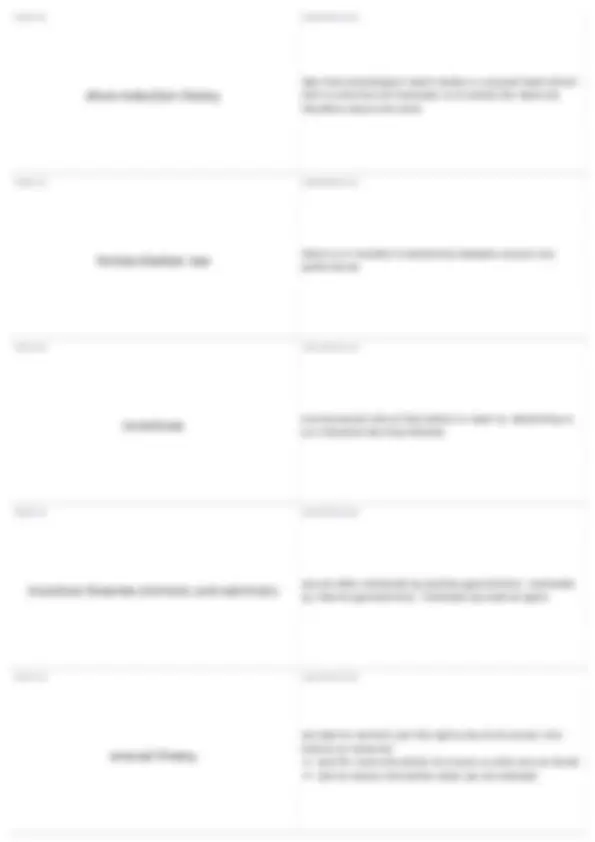
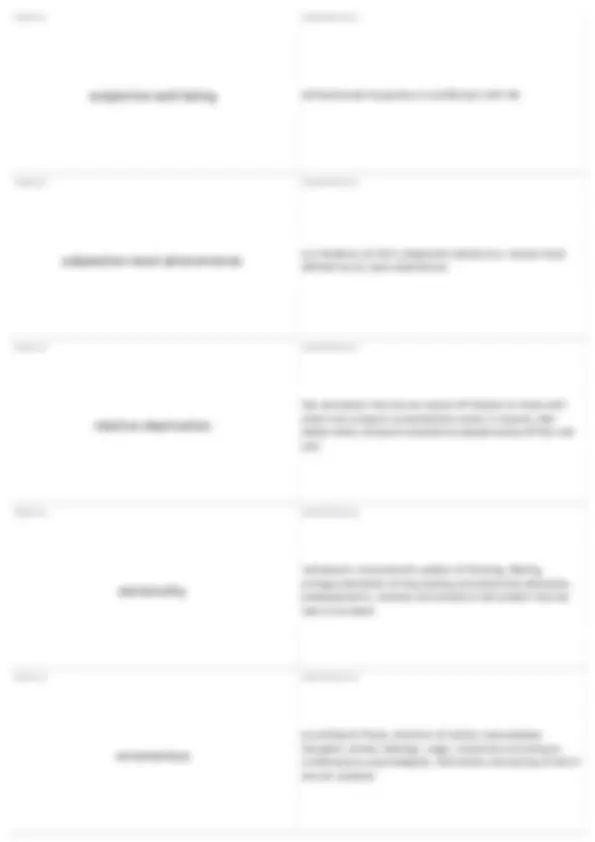
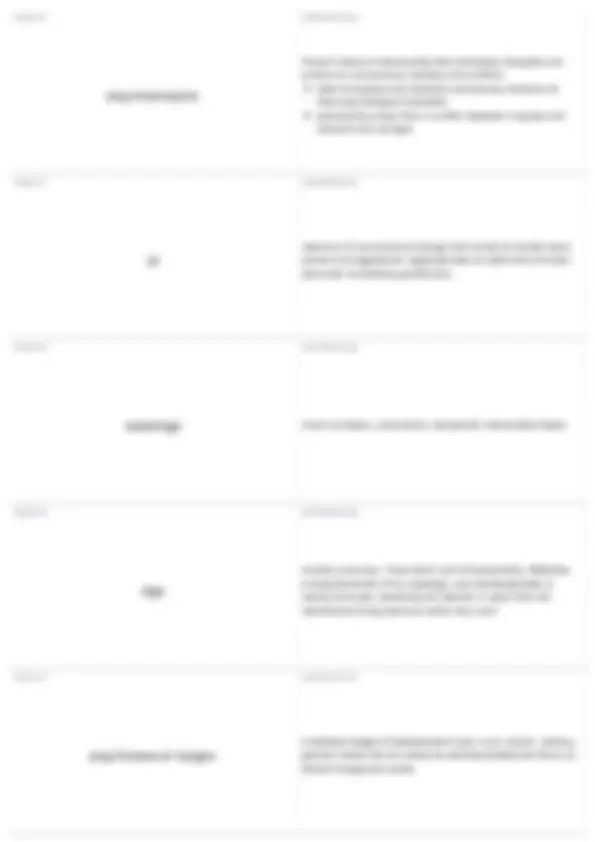
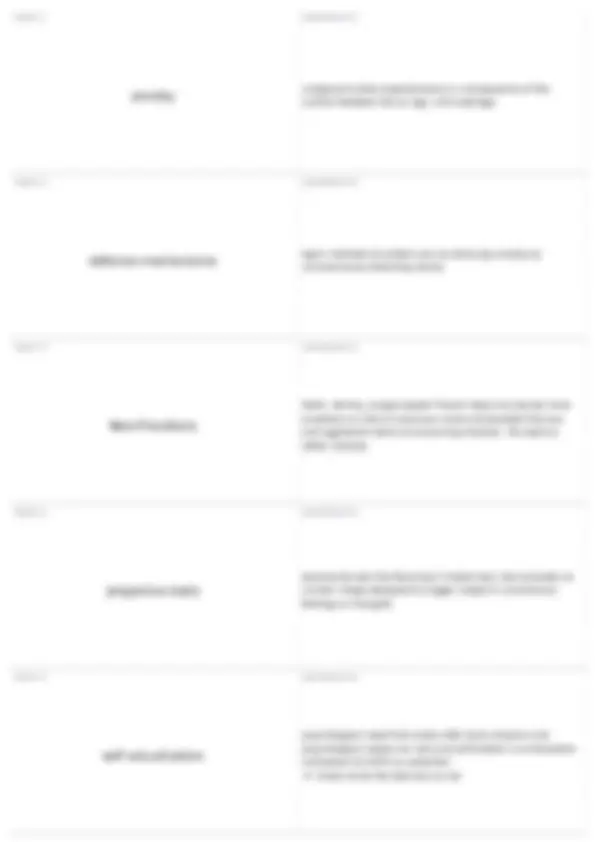
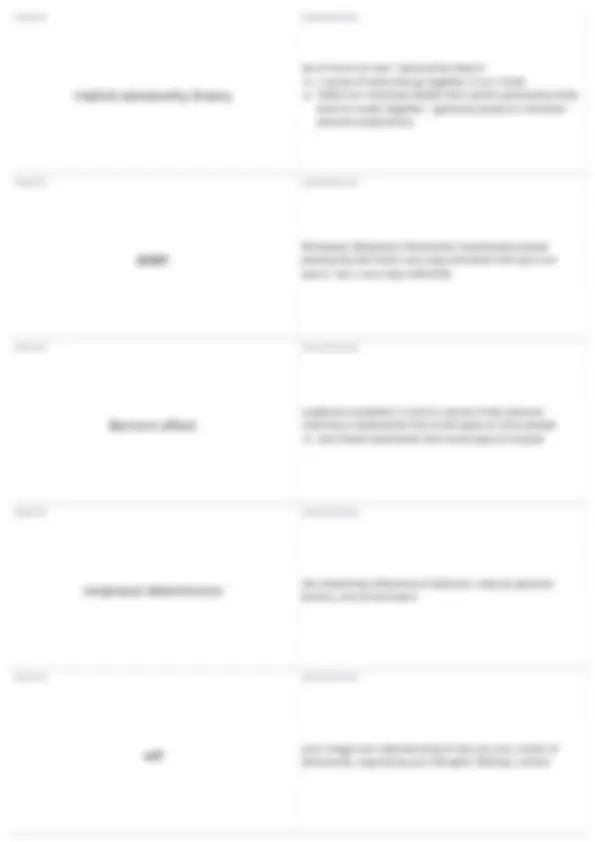
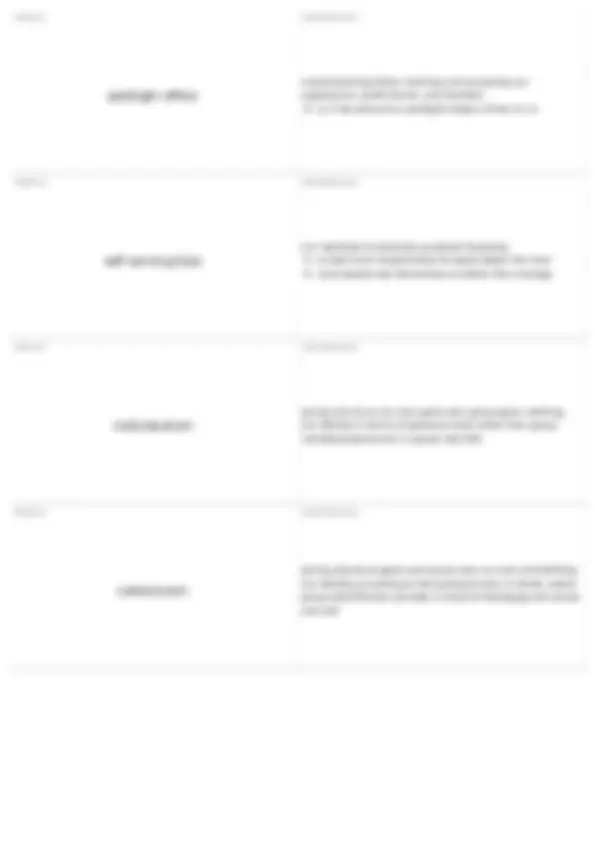


Study with the several resources on Docsity

Earn points by helping other students or get them with a premium plan


Prepare for your exams
Study with the several resources on Docsity

Earn points to download
Earn points by helping other students or get them with a premium plan
Community
Ask the community for help and clear up your study doubts
Discover the best universities in your country according to Docsity users
Free resources
Download our free guides on studying techniques, anxiety management strategies, and thesis advice from Docsity tutors
Definitions for various terms and concepts in the field of psychology, including intelligence quotient (iq), standardization, normal curve, reliability, validity, dyslexia, motivation, anxiety, defense mechanisms, neo-freudians, projective tests, self-actualization, and many more. It covers a wide range of topics in psychology, from intelligence and motivation to personality and development.
Typology: Quizzes
1 / 19

This page cannot be seen from the preview
Don't miss anything!












mental activities associated with thinking, knowing, remembering and communicating TERM 2
DEFINITION 2 step-by-step procedures that guarantee a solution if followed exactly TERM 3
DEFINITION 3 simple rule of thumb or thinking strategy for making judgments and solving problems efficiently speeder than algorithms, but more prone to error TERM 4
DEFINITION 4 judging the likelihood of something based on how well it represents or matches particular prototypes TERM 5
DEFINITION 5 estimating the likelihood of events based on the ease of remembering them (if it easily comes to mind, we assume such instances are common)
tendency to be more confident than correct - overestimate the accuracy of our beliefs and judgments TERM 7
DEFINITION 7 the way an issue is posed (or framed) changes the likelihood of getting a certain responsefor ex, people will be likely to buy a product labeled 90% fat free!But they will be unlikely to buy a product labeled as 10% fat content. TERM 8
DEFINITION 8 we make decisions based on having beliefs confirmed by random occurrences we search for information that supports our beliefs and preconceptions but ignore or distort evidence that contradicts them TERM 9
DEFINITION 9 we think we know something all along once we see it explained to us TERM 10
DEFINITION 10 using a hint or cue as a starting point for decision makingex. use prices you are familiar with as comparison to judge the fairness of the price of a similar item
generating a cognitive strategy to accomplish a specific goal many psychologists believe this is the quintessential definition of cognition TERM 17
DEFINITION 17 trying one solution after another in no particular order (sometimes) often a good strategy to use for things you are unfamiliar with TERM 18
DEFINITION 18 an arbitrary system of communication that combines symbols in rule-based ways to create meaningbook definition: our spoken, written, or signed words and the ways we combine them to communicate meaning TERM 19
DEFINITION 19 individual sound units TERM 20
DEFINITION 20 smallest units of meaning (like "dog", "-ish") syllables
grammatical rules that dictate sentence construction TERM 22
DEFINITION 22 social context, prior statements by others, nonverbal cues, inflection on our words this is lost in texting, hence the use of emoticons to try to correct this TERM 23
DEFINITION 23 the view that all thought is represented linguistically, so language defines and limits our thinking what you say and how you say it determines what and how you think you can only think about things you know the words for TERM 24
DEFINITION 24 the view that characteristics of the language we speak influence some aspects of our thinking speakers of different languages may think differently about the world TERM 25
DEFINITION 25 ability to learn from experience, solve problems, and use knowledge to adapt to new situations
a test designed to assess what a person has previously learned TERM 32
DEFINITION 32 devised by Binet, a measure of intelligence test performance the chronological age that most typically corresponds to a given level of performance ex. a child who performs at the average level of a 7 year old is said to have a mental age of 7 TERM 33
DEFINITION 33 originally defined as the ratio of mental age to chronological age multiplied by 100 (Mental Age / Real Age) * 100 = IQ on contemporary tests, test-taker's performance is represented relative to the average performers of others the same age average is 100. Most people fall between 85 and 115 (normally distributed, like many human characteristics) TERM 34
DEFINITION 34 average is 100, standard deviation is 15 about 70% of the population is within one standard deviation of the mean about 50% of population is above average, about 50% is below, technically TERM 35
DEFINITION 35 defining meaningful scores by comparison with the performance of a pretested group called the "standardization group" they set the standard to compare others' scores to
the symmetrical bell-shaped curve that describes the distribution of many physical and psychological attributes most scores fall near the average, with fewer and fewer scores lying near the extremes TERM 37
DEFINITION 37 most widely used intelligence test today, designed to measure intelligence in adults and older adolescents (there are versions for children as well) 11 subtests broken into verbal and performance areas (verbal is like crystallized intelligence, and performance is like fluid) TERM 38
DEFINITION 38 the extant to which a test yields consistent results can assess by consistency of scores two halves of the test, alternate forms of the test, or retesting the same test TERM 39
DEFINITION 39 the extent to which a test measures or predicts what it's supposed to TERM 40
DEFINITION 40 a learning disability that involves difficulty with accurate and/or fluent word recognition and decoding of language into meaning struggle with looking at written language and turning it into sounds or spoken language
idea that physiological need creates an aroused state (drive) that is aversive and motivates us to satisfy the need and therefore reduce the drive TERM 47
DEFINITION 47 there is an inverted U relationship between arousal and performance TERM 48
DEFINITION 48 environmental stimuli that attract or repel us, depending on our individual learning histories TERM 49
DEFINITION 49 we are often motivated by positive goalsintrinsic: motivated by internal goalsextrinsic: motivated by external goals TERM 50
DEFINITION 50 we seek to maintain just the right amount of arousal, this directs our behavior look for more stimulation to arouse us when we are bored look to reduce stimulation when we are stressed
theory that most basic physiological needs (hunger and thirst) must be met before one can focus on meeting more advanced needs. Next comes safety needs, then belongingness and love, then esteem, then self-actualization and transcendence. minimal evidence in support of this model. many counterexamples. TERM 52
DEFINITION 52 incremental (growth) mindset: intelligence/ability is a malleable, increasable, and controllable qualityentity (fixed) mindset: intelligence/ability is fixed or uncontrollable trait TERM 53
DEFINITION 53 desire to achieve knowledge and gain understanding usually leads to better longterm learning driven to learn because interested in it correlated with incremental intelligence beliefs look at tasks as opportunity to increase knowledge, enjoy a challenge TERM 54
DEFINITION 54 desire to acquire good grades desire to appear more competent than others, stick to familiar tasks likely to reflect positively on ability avoid mistakes, they are a reflection of lack of competence learning is achieved secondary to achieving performance goal TERM 55
DEFINITION 55 a response of the whole organism, including: physiological arousal conscious experience expressive behaviors
self-perceived happiness or satisfaction with life TERM 62
DEFINITION 62 our tendency to form judgments relative to a neutral level defined by our past experiences TERM 63
DEFINITION 63 the perception that we are worse off relative to those with whom we compare ourselves(also works in reverse, feel better when compare ourselves to people worse off than we are) TERM 64
DEFINITION 64 individual's characteristic pattern of thinking, feeling, actingcombination of long lasting and distinctive behaviors, predispositions, motives and emotions that predict how we react and adapt TERM 65
DEFINITION 65 according to Freud, reservoir of mostly unacceptable thoughts, wishes, feelings, urges, memories.according to contemporary psychologists, information processing of which we are unaware
Freud's theory of personality that attributes thoughts and actions to unconscious motives and conflicts seek to expose and interpret unconscious tensions to treat psychological disorders personality arises from a conflict between impulse and restraint (id and ego) TERM 67
DEFINITION 67 reservoir of unconscious energy that strives to satisfy basic sexual and aggressive urgesoperates on pleasure principle - demands immediate gratification TERM 68
DEFINITION 68 moral compass, conscience, represents internalized ideals TERM 69
DEFINITION 69 mostly conscious, "executive" part of personality. Mediates among demands of id, superego. and realityoperates in reality principle, satisfying id's desires in ways that will realistically bring pleasure rather than pain TERM 70
DEFINITION 70 childhood stages of development (oral, anal, phallic, latency, genital) where the id's pleasure seeking tendencies focus on distinct erogenous zones
according to Rogers, an attitude of total acceptance toward another person TERM 77
DEFINITION 77 all our thoughts and feelings about ourselves in answer to the question, "Who am I?" TERM 78
DEFINITION 78 real self = how we really see ourselvesideal self = how we would really like to see ourselves TERM 79
DEFINITION 79 a characteristic pattern of behavior or a tendency to feel and act a certain way, (as assessed by self-reports on a personality test and peer reports) TERM 80
DEFINITION 80 a cluster of behavioral tendencies that occur together
perception that chance or outside forces beyond one's control determine one's fate TERM 82
DEFINITION 82 perception that one control's one's own fate TERM 83
DEFINITION 83 hopelessness and passive resignation that you feel when unable to avoid repeated aversive events TERM 84
DEFINITION 84 views behavior as influenced by interaction between persons and social context TERM 85
DEFINITION 85 Mischel criticized trait theory - traits do not always show consistencytraits interact with whatever situation we find ourselves in research agrees there are short term differences in traits due to situation, but long term stability in personality over lifetime
overestimating others noticing and evaluating our appearance, performance, and blunders as if we presume a spotlight always shines on us TERM 92
DEFINITION 92 our readiness to perceive ourselves favorably accept more responsibility for good deeds than bad most people see themselves as better than average TERM 93
DEFINITION 93 giving priority to our own goals over group goals, defining our identity in terms of personal traits rather than group membershipcommon in places like USA TERM 94
DEFINITION 94 giving priority to goals over group over our own and defining our identity according to that groupcommon in Korea, where group identification provides a sense of belonging and values and self